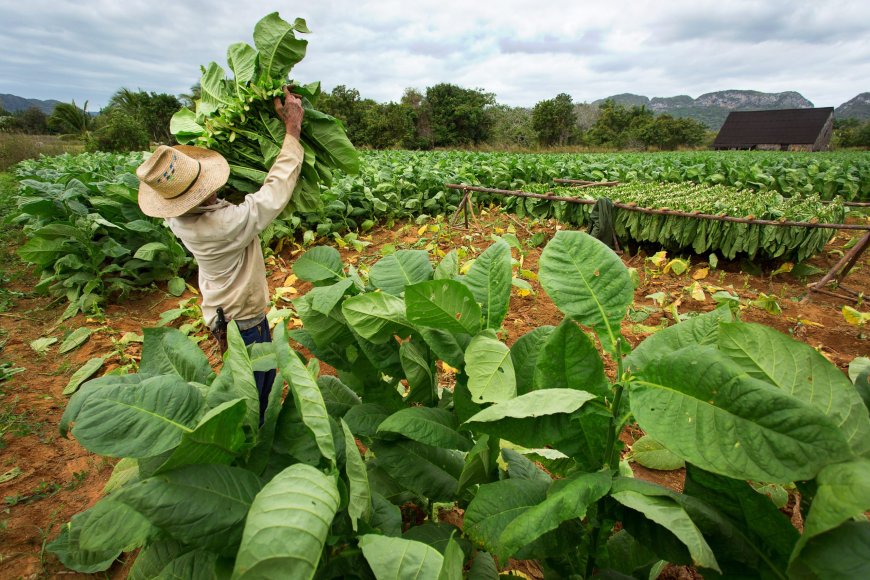The Tobacco Research Board (TRB)’s Commemorates 75th Anniversary Seed and Varieties Anniversary
The Tobacco Research Board (TRB)’s Commemorates 75th Anniversary Seed and Varieties Anniversary

The Tobacco Research Board (TRB), (TRB) now proudly known as Kutsaga, a name corruptly derived from the Shona word “Kutsvaga”, meaning “to research”, recently Commemorated, its 75th Anniversary, marking 75 years of agricultural research excellence.
Francis S. Bingandadi
The Tobacco research Board was established in 1950 under the Tobacco Research Act [Chapter 18:21], the Kutsaga roots trace back even further to 1935, when the Tobacco Research Advisory Board was formed to advise the Minister of Agriculture on the industry’s needs.
Speaking at a Field Day at Kutsaga, the Kutsaga Board Chairman, Mr. Aaron Denenga, said that, in Zimbabwe, commercial tobacco production was first undertaken in the 1894-95 season, but the outbreak of World War II disrupted these early efforts, depleting both finances and staff. It was only after the war, amid rising demand for flue-cured tobacco that growers rallied for renewed research efforts. This led to the Tobacco Research Act of 1950, which formally established the Tobacco Research Board as we know it today. The Zimbabwe Tobacco Association (ZTA) is acknowledged as played an instrumental role in TRB creation.
In 1954, the Kutsaga Research Station was inaugurated along Prince Edward Dam Road (now Seke Road). Prior, stations in Trelawney (1934), Karoi (1946) and Chipinge (1949) were established and in 1959 Broken Hill station in Kabwe, Zambia.
Mr. Aaron Denenga, said that, “Over the past 75 years, Kutsaga has gone through many and major transformations but steadfastly continued to play a pivotal role in shaping Zimbabwe’s tobacco industry, cementing its position as the premier tobacco industry on the African continent.”
The Kutsaga Board Chairman, said that, “As we step into the Fourth Industrial Revolution, we are committed to transforming Kutsaga into a self-sustaining agricultural research hub, leveraging cutting-edge technologies such as: Artificial Intelligence (AI) and robotics; Internet of Things (IoT) and blockchain; 3D printing, genetic engineering, and even quantum computing.”
Mr. Denenga, revealed that Kutsaga, is clear of its vision; “to advance agricultural research while remaining grounded in our tobacco research heritage. We are exploring exciting new frontiers, including: Seed potato production; Hemp and cannabis varieties; and Alternative crops and innovative uses for tobacco, such as biopharming, nicotine extraction, and solanesol production.
Mr. Denenga, said that as part of the momentous celebration Kutsaga has come up with quarterly events to celebrate the 75 years of tobacco research excellence starting with the Tobacco Seed and Variety Field day themed “75 Years of Research Excellence and Innovations, to include an “intellectual discourse and discovery at our Tobacco Research Symposium and Awards, where we will explore the latest advancements in our field and the awards; where we will be honouring some of the giants who have shaped this industry.”
In his Opening Remarks Professor Obert Jiri, the Permanent Secretary in the Ministry of Lands, Agriculture, Fisheries, Water, and Rural Development said that, “this milestone is not merely a celebration of an institution’s endurance but recognition of its pivotal role in shaping the tobacco value chain and our nation’s agricultural legacy.”
Prof. Jiri said that, “For decades, Kutsaga has been a torchbearer of progress, aligning its mission with Zimbabwe’s agricultural priorities—driving food security, and economic growth through responsible production practices. Kutsaga’s story is a testament to how research and innovation can transform an industry, and by extension, a nation. Thus, today ‘s showcase is a celebration of the entire tobacco industry, a celebration of the contribution of each value chain actor in the tobacco industry.”
The Permanent Secretary said that, “in 1950, a visionary idea took root—one that recognized tobacco not just as a crop, but as a catalyst for prosperity. Through decades of challenges—climate change, evolving global regulations, and ecological pressures—the tobacco industry along with Kutsaga have exemplified resilience. The institution’s ability to innovate under pressure, from ensuring growers have sustainable agrochemical alternatives to adopting the World Health Organization Framework Convention on Tobacco Control (WHO FCTC) ’s Articles, mirrors Zimbabwe’s own resolve to thrive amid adversity.”
“With over 75 years of world class tobacco research experience especially in developing elite tobacco varieties, the institution has not only bolstered Zimbabwe's reputation as a premier producer of high-quality, flavor-rich tobacco but also sparked transformative change at the grassroots level. This has empowered more than 120,000 smallholder farmers, enhancing productivity, guaranteeing access to premium markets, and subsequently, increased incomes and improved livelihoods. By achieving these outcomes, Kutsaga's work embodies the Vision 2030 agenda's core principles: shared economic growth and sustainable development,” said Prof. Jiri.
Professor Jir, praise Kutsaga for it's, “dedication to sustainable production practices and agricultural productivity has been honed through incremental gains over seven decades and is exemplified through initiatives like the development of multi-disease-resistant tobacco varieties. The variety field day showcase today, displaying the very earliest varieties grown in Zimbabwe with no resistance to any economically important disease and capable of yields of 600kg/ha and to the latest hybrids such as K RK66 and K RK76 with different levels of disease resistance to all economical important diseases and having yield potential of greater than 4 500kg/ha bears witness to "75 Years of Research Excellence and Innovations. “
Kutsaga has recently also developed, “the Pesticide Approval Scheme Service (PASS), energyefficient barn designs, and the innovative Float Tray System for seedlings production. These initiatives are instrumental in driving Zimbabwe's agricultural transformation agenda, tackling pressing challenges while laying the groundwork for a lasting legacy of sustainable growth and environmental stewardship,” said Prof jiri.
The Tobacco Research Station has also developed climate-smart drought-adaptive varieties; researched into ecofriendly tobacco curing fuels such as Liquid Petroleum Gas (LPG), Biogas, and solar energy, alongside efforts to reduce deforestation, embodies a fundamental principle: The future of our economy depends on our ability to protect the environment,” added Prof. Jiri.
Dr. Frank Magama, Chief Executive, said that, “the success of the Zimbabwean tobacco industry is a collective effort. It is built on the hard work and dedication of our farmers, the expertise of our researchers, the support of our industry partners, and the enabling environment provided by the government,” and that, “we're showcasing decades of excellence in tobacco breeding, the old, current, new and experimental lines all bred for higher yields, better quality, and increased resistance to pests and diseases. Think of it as a tobacco genetics showcase, a vivid glimpse of history frozen to this moment.”
Dr. Magama, said that, “as we look forward to the next 25 years, we know that challenges lie ahead. Climate change, evolving consumer preferences, and the ever-changing global landscape demand that we remain agile, innovative, and united.”

 Francis
Francis 





